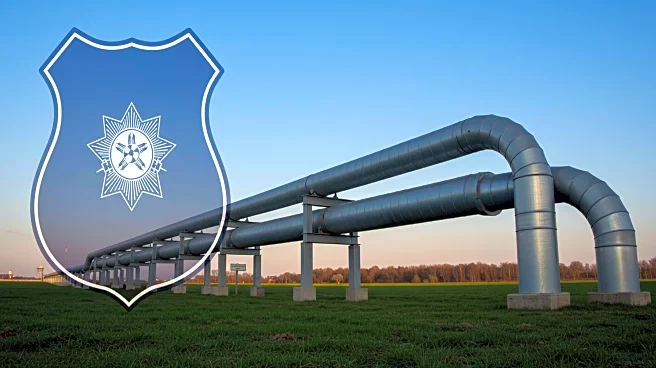What is the story about?
What's Happening?
A Ukrainian man has been arrested by Italian authorities in connection with the sabotage of the Nord Stream pipelines, which connect Russia and Germany. The suspect is believed to have coordinated the attack, which involved a team of divers planting explosives on the pipelines. These divers reportedly used a sailboat chartered from Rostock, Germany, under false identities and shell company credentials. The sabotage, which occurred on September 26, 2022, resulted in significant damage to three of the four pipelines, although they were not operational at the time. The incident has been under investigation for months, with initial suspicions pointing towards Russia, Poland, or the United States. However, investigators have concluded that the operation was carried out by individuals working for Ukraine, who had a vested interest in disrupting Russia's gas exports to Europe.
Why It's Important?
The arrest is a significant development in the ongoing geopolitical tensions surrounding energy security in Europe. The Nord Stream pipelines have been a focal point of contention, especially in the context of the Russian invasion of Ukraine. Germany's refusal to activate Nord Stream 2 and Russia's cessation of gas flow through Nord Stream 1 were strategic moves in the broader conflict. The sabotage further complicated the energy dynamics, impacting European energy policies and market stability. The arrest could lead to diplomatic tensions, particularly if the suspect's ties to Ukraine are confirmed, potentially affecting Ukraine's relations with European nations. This development underscores the vulnerabilities in critical infrastructure and the geopolitical risks associated with energy dependencies.
What's Next?
The suspect is expected to be extradited to Germany, where he will face legal proceedings, including an indictment and trial. This process may take time, as it involves international legal cooperation. The outcome of the trial could have implications for international relations, particularly between Ukraine and European countries. Additionally, the incident may prompt European nations to reassess their energy security strategies and infrastructure protection measures. Political leaders and energy stakeholders will likely monitor the situation closely, as it could influence future energy policies and alliances.
Beyond the Headlines
The sabotage of the Nord Stream pipelines highlights the complex interplay between energy infrastructure and geopolitical strategies. It raises ethical questions about the use of sabotage as a tool in international conflicts and the potential consequences for civilian populations dependent on stable energy supplies. The incident may also lead to increased scrutiny of maritime security and the use of shell companies in covert operations, prompting regulatory changes to prevent similar occurrences in the future.















